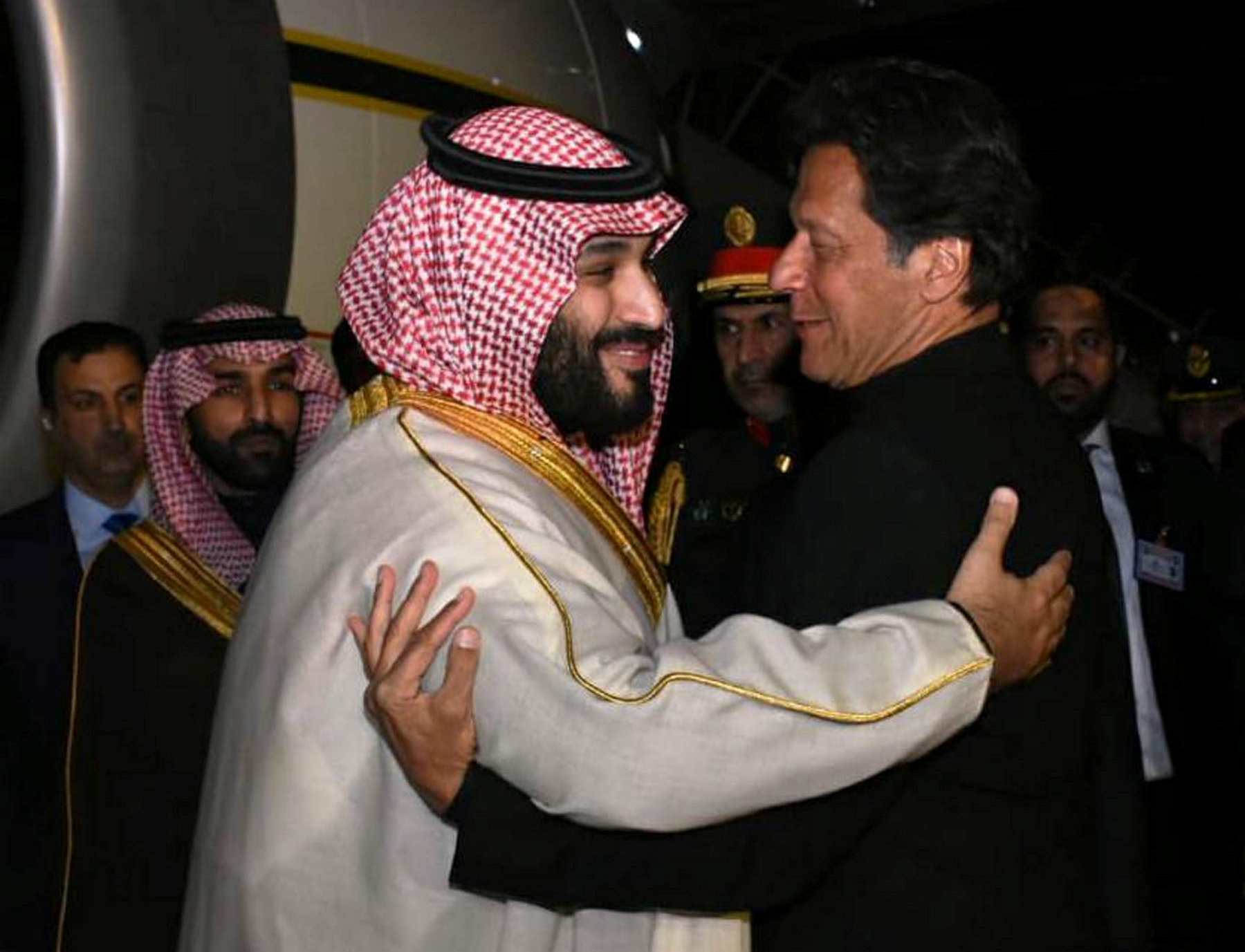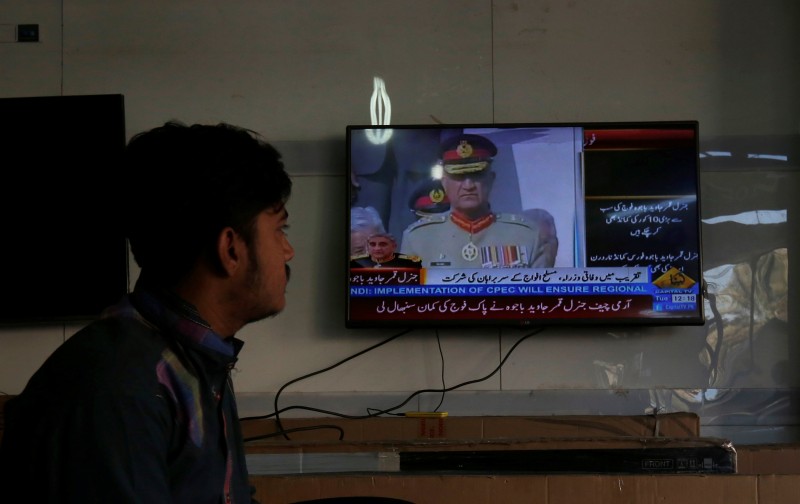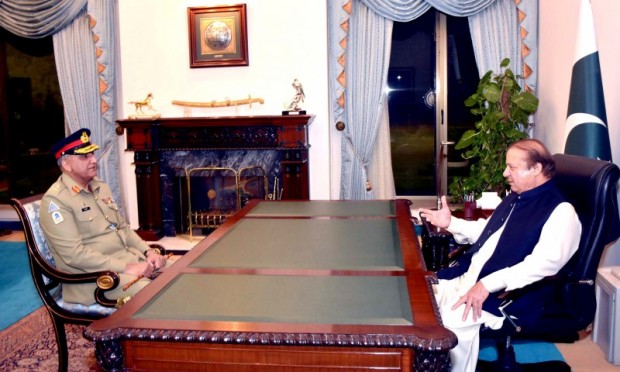- Investigators working for an anti-money laundering firm located $1 billion in assets tied to Pakistan’s former prime minister Nawaz Sharif, who was imprisoned following fraud exposed by the Panama Papers, the firm’s lawyer said.
- A Pakistani general tried to make a corrupt side deal involving kickbacks with the firm, according to the lawyer.
- Pakistan’s new prime minister Imran Khan — despite running on an anti-corruption platform — may let his predecessor out of prison in exchange for leading him to the money, the lawyer said.
After an American-founded anti-money laundering firm alleged that it found $1 billion in corrupt assets tied to an imprisoned Pakistani ex-prime minister, a frenzy straight out of a spy novel commenced, involving shadowy figures tied to Pakistan’s Army and intelligence service, a letter from the company’s lawyer shows.
The story involves an American committing suicide in Paris, offshore tax havens, Oxford faculty and a mysterious meeting in a London cafe. Pakistan is now in talks to release the former prime minister in exchange for a cut of the corrupt assets, according to the letter.
The anti-money laundering firm, Broadsheet LLC, said it found $1 billion hidden in Singapore that was tied to former Prime Minister Nawaz Sharif, who was imprisoned for corruption in 2017 following exposure in the Panama Papers, a Washington-based lawyer for the firm said in a March 21 letter obtained by The Daily Caller News Foundation.
The firm alleged that after it found the money, an Army general associated with the regime of current Prime Minister Imran Khan — who positioned himself as the cure to corruption — tried to shake Broadsheet down for a cut of the money, according to the letter.
Broadsheet said it rebuffed the corruption attempt and severed ties with Pakistan without telling where in Singapore the $1 billion was hidden, the letter shows. Now, the firm suspects Pakistan has resorted to another approach: striking a deal with Sharif to release him from prison in exchange for leading the government to the hidden money.
Pakistan hired Broadsheet to find and seize the proceeds of past Pakistani leaders’ corruption. The firm would be paid a 25 percent commission on recovered funds. Khan has speculated that previous politicians and elites have stolen as much as $100 billion as part of a culture of corruption that he aims to change.
But when Broadsheet located the mother lode of all corrupt assets, corruption from Pakistan’s intelligence service and its army emerged, according to allegations spelled out in the 14-page letter from Stuart Newberger, a lawyer with the Washington, D.C. law firm Crowell & Moring LLP, to Pakistan’s London-based lawyers. Pakistan’s lawyers denied knowledge of the actions and denied any wrongdoing by the country.

Pakistani Prime Minister Imran Khan greets Saudi Arabia’s Crown Prince Mohammed bin Salman. (Press Information Department (PID)/Handout via REUTERS)
An American anti-corruption firm owner tries to defraud the Pakistani government
In 2000, then-Prime Minister Prevez Musharraf hired Broadsheet — created by Colorado businessman Jerry James — to trace the assets in the U.S. and U.K. of 200 prominent Pakistanis tied to Benezir Bhutto, a deposed former prime minister.
Broadsheet accused Pakistan of stiffing the firm of a $600 million payment. Broadsheet entered into liquidation proceedings, where it was revived by another owner and incorporated in the Isle of Man.
In 2008, after he sold the company, James registered an imposter company with the same name in a different jurisdiction. Pakistan then accepted a deal James offered to settle the debt for only $2 million — a deal James couldn’t actually make since he no longer owned the real Broadsheet, Global Arbitration Review reported.
James jumped to his death from the balcony of a Paris hotel as a fraud investigation into his activities loomed, Offshore Alert reported.
The original Broadsheet’s effort to collect the debt it said Pakistan owed went on for years. Essentially, each prime minister wanted to go after his predecessor by using Broadsheet to expose him as corrupt.
In 2016, while Sharif was prime minister, an international arbiter in London ruled that the $2 million paid to the wrong Broadsheet did not absolve Pakistan of its debts and ruled against the nation, scheduling future proceedings to determine the dollar amount of the penalty.
Around that time, a man who said he was a relative of Sharif and acting on his behalf approached Broadsheet chief Kaveh Moussavi, who is also a prominent lawyer with Oxford University, Newberger wrote in his letter. The man, Anjum Dar, provided photos and documents that seemed to support his claim.
Dar said he could obtain settlement money for Broadsheet.
“However, Mr. Dar also made clear that there would be a quid pro quo for Pakistan making such settlement payments to Broadsheet — substantial bribes and kickbacks would have to be paid as a ‘commission’ to him and others,” Newberger wrote.
Moussavi rebuffed him and said lawyers would have to handle the settlement, the letter says.
Then, the 2016 Panama Papers leak exposed dozens of world elites using offshore accounts for dubious purposes. Sharif was one of the most prominent men caught in its net. He was removed from office in July 2017 and later sentenced for corruption charges following an investigation into sham companies, strange transfers, cash in Qatar, and London real estate. (RELATED: Qatar Has Given $1 Billion To US Universities)
An intercontinental scramble for pieces of the money
In July 2018, the Army-backed Khan was elected prime minister.
Days prior, there was an arbitration hearing in London on the dispute between Broadsheet and Pakistan. Following the hearing, a senior partner at the massive New York-headquartered consultancy McKinsey & Co., Kersten Pucks, introduced Moussavi to Zafar Ali, a London-based lawyer with “strong connections to Pakistan,” Newberger’s letter said. Both were friends of Pucks.
They met at Puck’s house. “At the first meeting Mr. Moussavi was told by Mr. Ali that he was acting with instructions from the newly elected Prime Minister Imran Khan,” the letter said. “Mr. Ali also said he was acting for the Finance Minister, the Inter-Service Intelligence agency (‘ISI’) and the Attorney General.”
“At that time, this was viewed as a ‘professional approach’ involving qualified counsel and was intended to go beyond a simple settlement of this dispute,” the letter said.
Ali wanted Broadsheet to do potentially lucrative work hunting down the corrupt assets of Sharif — one of the very prime ministers who had stiffed the firm — and would also settle the past debt “for a considerable sum,” according to Newberger.
Soon after, Saudi Arabian sources tipped off Broadsheet that a stunning $1 billion tied to Sharif had been transferred to Singapore. Without giving details, Broadsheet told Ali what its investigators had found. It meant a massive payday for both Broadsheet and Pakistan.
On July 31, 2018, Ali asked Moussavi by text message to help him prepare bullet points for a meeting with Khan when he took office in August.
“Mr. Moussavi then had a follow-up meeting with Mr. Ali at which he outlined the history of Sharif-related corruption that Broadsheet had uncovered and analyzed as part of the London arbitration,” Newberger’s letter said. “Mr. Moussavi further briefed Mr. Ali on what needed to be done to help rid Pakistan of the historic curse of corruption pursued by the Sharif and Bhutto families for so many years.”
“They agreed that Mr. Ali would put these points to the new Prime Minister, who had campaigned on a pledge to change the country’s history and culture of corruption and introduce ‘clean government’ after so much unlawful conduct by his predecessors,” the letter continued. “Mr. Ali also noted he would brief the new Attorney General as well as senior members of the ISI.”
By Aug. 5, 2018, Ali was in Pakistan and texted Moussavi that he had meetings with the prime minister and the finance minister. “We are close … tantalisingly close,” he wrote, according to the letter.
Moussavi replied: “I suggest you try and bring back some of the files on the Sharifs so we show the new team how effectively we can operate … We will trace, locate, freeze, seize and repatriate stolen assets before they have got their heads round how this is done.”
Sidelined by the ISI
The deal was going so well that Ali asked Pucks, the McKinsey partner, “to have his passport ready to travel to Pakistan to assist Broadsheet in the preparation of the new agreements,” according to Newberger’s letter.
On Sept. 6, 2018, Ali texted Moussavi that he was waiting to see if the director general of the ISI “wants to meet me and if so when. The next week is crucial to whether this is a Go or not,” Newberger’s letter shows. On Sept. 9, Ali and Moussavi had meetings with a Pakistani lawyer named Shaid Iqbal who Ali said was “very close to Prime Minister Khan and was going to arrange the final meeting.”
On Sept. 28, Ali texted: “I have now met the AG and the Minister of Law. – It is agreed!” He asked Pucks to come to Pakistan on Oct. 24.
Newberger’s D.C. law firm prepared two contracts: One to settle the issue of prior unpaid debts to Broadsheet and another establishing how Broadsheet and Pakistan would embark on the lucrative new venture together.
But as word of the $1 billion got around to Pakistan’s powerful, Moussavi sensed that Ali was “sidelined as the lead negotiator,” Newberger’s letter said. “Instead, several officials later came forward to take over the discussions and change their character from transparency and cooperation to efforts to obtain unlawful kickbacks.”
“I am done now,” Ali said, adding that ISI wanted to go over some details with Broadsheet. “It warrants repetition – I would like nothing spoken about with any third party until after Sunday evening when I have landed safely in the UK.”
A mysterious general
Ali told Moussavi that people in Pakistan wanted to meet him for themselves, claiming they wanted to “know who he is,” according to Newberger’s letter. Moussavi said that was “nonsense” since he had worked with them for years
“In his view Mr. Ali was being pushed aside by others in Pakistan eager to pursue the Sharif funds in Singapore for themselves,” Newberger wrote.
“After the two draft contracts had been sent to Pakistan, a delegation of Pakistani officials traveled to London for meetings with the British authorities — ironically to discuss anti-corruption law enforcement issues,” the letter continued. “Mr. Moussavi was told of the arrival of the delegation by a ‘Mr. Malek,’ who said he was part of the ‘military investigations’ branch of ISI.”
“Moussavi met Major General ‘Malek,’ as he called himself, in Hampstead on 13 Oct at the Café Rouge,” Newberger wrote. “General Malek was extremely well informed about the entire Broadsheet situation and the two draft agreements, as well as the Sharif funds in Singapore. General Malek told Mr. Moussavi that Broadsheet was ‘wasting its time’ with Mr. Ali because others in the Pakistani Government were now managing the case and could close the deal on the two new agreements.”
“General Malek categorically stated to Mr. Moussavi that Broadsheet could get both agreements signed and enforced — but only if his ‘cut’ was guaranteed,” the letter said.
The general asked: “People are wondering why you should make 25 billion dollars out of the contract we are giving you?” according to the letter, referring to the prime minister’s claim that there could be up to $100 billion in corrupt money tied to former Pakistani officials and Broadsheet’s 25 percent commission.
“Mr. Moussavi stated clearly that the conversation he was pursuing was nothing less than a criminal conspiracy … and that neither he nor Broadsheet could even discuss the matter further under any circumstances, no matter how much money was being offered,” the letter said. “Their meeting ended abruptly and Mr. Moussavi has not spoken to General Malek since.”
Newberger’s letter concludes by saying that Broadsheet believes that after it rebuffed the general’s kickbacks attempt, Pakistani officials decided to cut out Broadsheet. Rather than having the firm seize Sharif’s $1 billion using money laundering statutes, Pakistan offered a deal with the corrupt politician, letting him out of prison if he gives them the money, according to Newberger’s letter.
“Our understanding is that the new agreements were not signed because Mr. Moussavi refused to agree to the requests to pay bribes and kickbacks,” the letter said. “We also understand that the Sharif funds remain in the Singapore bank account and are the subject of on-going discussions between Sharif and the Government to release him from prison in return for a turn-over of some of those funds.”

A man watches incoming Army Chief of Staff Qamar Javed Bajwa during a ceremony. REUTERS/Akhtar Soomro
Terse response from Pakistan’s lawyers
On April 9, Pakistan’s London-based attorney, Mark Levy, of the firm Allen Overy LLC, responded with a three-paragraph note obtained by TheDCNF.
Although you have marked the letter “Confidential Settlement Communication,” as I have made clear, my clients do not see any connection between the allegations contained in your document of 21 March and any settlement discussions.
With regard to those allegations, my clients have no knowledge of those matters and any allegations of illegal behaviour on the part of my clients are denied. My clients are under no obligation to provide a “detailed response” and, given their lack of knowledge, it is hard to see what detail they could provide in any event.
With regard to settlement discussions, as I have explained previously, in order for these to progress it would greatly assist if your client were to put forward a slightly more realistic offer than the one put forward to date.
Neither side’s lawyers responded to a request for comment from TheDCNF.

Pakistan’s then-Prime Minister Nawaz Sharif (R) talks with Qamar Javed Bajwa, Pakistan’s newly designated Army Chief, at the Prime Minister’s House in Islamabad, Pakistan, November 26, 2016. PID/Handout via REUTERS
Email Luke at luke@dailycallernewsfoundation.org. Follow him on Twitter.
All content created by the Daily Caller News Foundation, an independent and nonpartisan newswire service, is available without charge to any legitimate news publisher that can provide a large audience. All republished articles must include our logo, our reporter’s byline and their DCNF affiliation. For any questions about our guidelines or partnering with us, please contact licensing@dailycallernewsfoundation.org.


